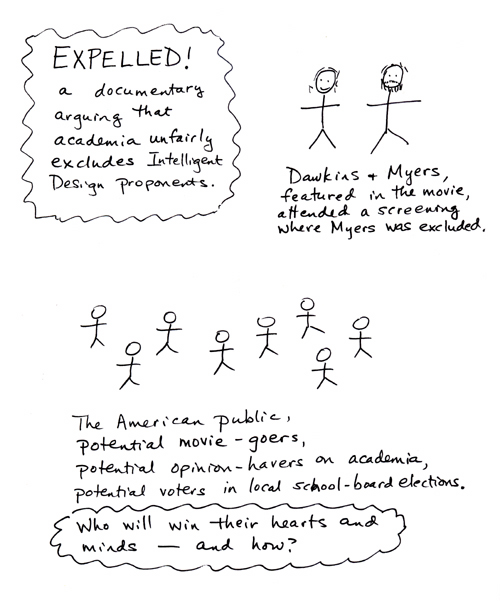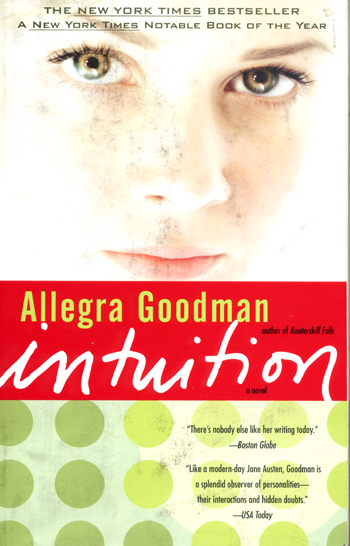Chris Mooney lays out the argument behind “framing”. I give my thoughts, item by item.
Category Archives: Communication
A message about science worth communicating to the public.
In light of all the recent discussion about the “framing” of the Expelled! expulsion, it occurs to me that maybe part of the reason that the argument seems so unproductive is that the parties involved haven’t really agreed on what, exactly, they’re trying to communicate to the public at large.
Here’s my suggestion for a message worth communicating clearly: science isn’t politics.
Scientists call for public action in support of research with animals.
For those who have been following the activities of “animal rights” activists, including their attacks of the homes of researchers — and the reticence of the public in the face of such violent attacks — a recent Commentary in Biological Psychiatry [1] will be of interest. In it, a number of scientists call on their scientific peers to actively engage in dialogue with the public about what scientific research with animals actually involves and why it is important.
From the commentary:
Movie screening expulsion: whose hearts and minds are up for grabs?
Maybe you heard the news that PZ Myers and Richard Dawkins went to a screening of the documentary Expelled! in Minneapolis, except that, because he was recognized, PZ Myers was barred from the screening (despite having signed up ahead of time like the other attendees). Here’s the New York Times story, and Greg Laden has collected roughly a bajillion links to blog posts in the aftermath of the incident. The big debate seems to be whether Myers ought to have brought attention to the fact that he was barred from the screening, or whether he should have just gotten a haircut at the mall to pass the time until it was over.

Talking with kids about drugs.
Abel Pharmboy and Drugmonkey are having a conversation that I wish I could approach completely abstractly, about what parents ought to be telling their kids about drugs (whether legal or illegal) and their use. (Also, Page 3.14 has a reader’s poll about whether teens can be scared off illegal drugs. Poll results will be published in the ScienceBlogs Weekly Recap newsletter, for which you can sign up here.)
Of course, having two kids who are not yet teens but don’t seem to be getting any younger, the issue doesn’t feel abstract at all. The clock is ticking.
Here’s what is currently shaping my strategy:
Book review: Intuition.

Allegra Goodman’s novel Intuition was published in 2006, and although I heard very good things about it, I was busy enough with other stuff that I didn’t chase down a copy to read it. Finally, last November, my department chair lent me her copy, insistent that I had to read it when I got a chance — not for any academic purpose, but to do something nice for myself. Between semesters, I finally got a chance to read it.
I have a really good department chair.
Graduate students: NSF Debating Science program.
I’m passing on information about a program sponsored by the National Science Foundation for graduate students. The program, organized by the University of Montana Center for Ethics, is called Debating Science 2008, and here’s how it’s described on the announcement:
The project of being a grown-up scientist (part 2).
In my earlier post, I described the feeling I had as I started my graduate training in chemistry that there was a huge pile of knowledge I would need to acquire to make the transition from science student to grown-up scientist. I should make it clear (in response to JSinger’s comment that I seemed to be reserving the “grown-up” designation for principal investigators) that the student versus grown-up chasm was one that I thought of primarily in terms of how much I felt I’d have to learn by the time the Ph.D. hit my hand in order not to feel like a total impostor representing myself as a chemist. This was the biggest, scariest to-do list I had ever imagined, but I also couldn’t imagine that it was possible to be a successful academic chemist without being to put check marks next to most of the items on it. There were some grad students in the cohorts a few years ahead of me who seemed to be making good progress with that to-do list. And, there were some PIs who clearly hadn’t done so well with it … but none of them were “successful” in the way I wanted to be (although some were officially quite successful in terms of funding and publications).
For all the talk of extended sojourns in grad school or postdoctoral positions infantilizing trainees, I wouldn’t want to claim that trainees are intellectually or emotionally immature. But that kind of maturity isn’t what’s at the heart of being a scientific grown-up. Rather, it’s about a certain kind of facility in navigating your professional environment — from the lab or the field, to the hunt for funding, to the communication of your results and insights to other scientists, to the other sorts of interpersonal negotiations that make the science happen. It’s being a full member of a professional community, taking your responsibilities to that community seriously, and being invested in the direction that community goes and how well it functions.
I wanted all that — plus, to get my experiments to work, so I could actually write a dissertation and get my degree in a reasonable number of years. But it didn’t take long at all to discover that most advisors don’t talk with their trainees about the arcane knowledge the grown-ups seem to have. Obviously, this would make getting that knowledge much harder.
Why aren’t there regular discussions between advisor and advisee about how to be a grown-up scientist?
Rules, community standards, and policing: Casey Luskin and ResearchBlogging.
You may have been following the saga of intelligent design proponent Casey Luskin’s use of the ResearchBlogging.org “Blogging on Peer-Reviewed Research” icon in a way that didn’t conform to the official guidelines for its use.
The short description on ResearchBlogging’s mission says:
Research Blogging helps you locate and share academic blog posts about peer-reviewed research. Bloggers use our icon to identify their thoughtful posts about serious research, and those posts are collected here for easy reference.
The guidelines for using the spiffy icon include registering with ResearchBlogging, something Luskin did not do at first in the post for which he used the icon. However, Luskin made changes that, in his estimation, brought his post into compliance with the guidelines. Did he succeed? And, is there any effective way for a community to enforce compliance to the spirit of its rules, rather than simply to the letter?
Tracking down a source.
Maybe you saw the story in the New York Times about new research that may show that ingesting too much caffeine while pregnant increases the chances of miscarriage. And, if you’re like me, one of the first things you did was try to track down the actual research paper discussed in the newspaper article.
If so, I hope you’ve had better luck than I have.
